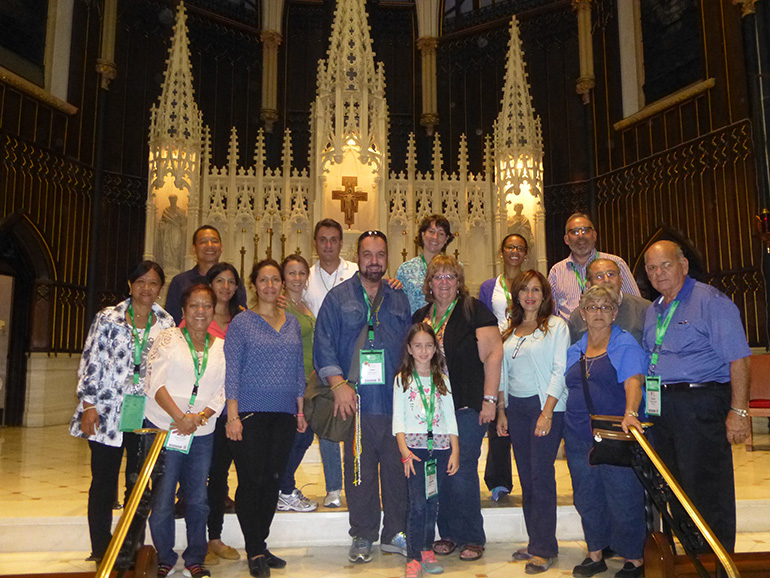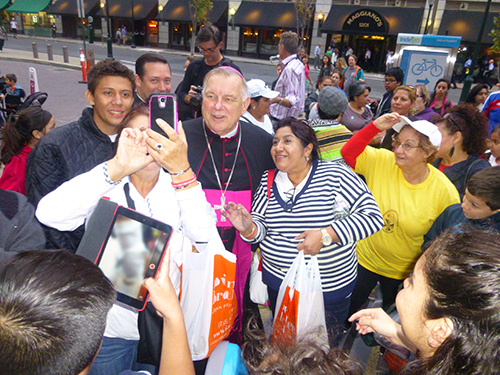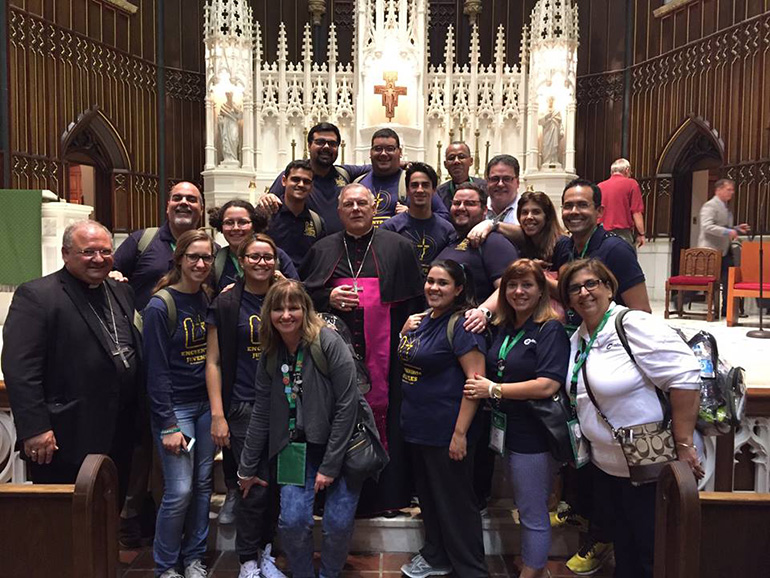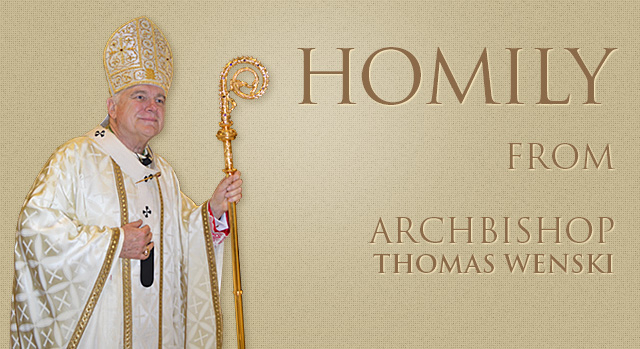By Archbishop Thomas Wenski - The Archdiocese of Miami

Photographer: ANGELIQUE RUHI-LOPEZ | FC
The official 16-member pilgrimage group to the weekend festivities at the World Meeting of Families pose for a photo at St. John the Evangelist Church in Philadelphia before the celebration of a Mass for all the pilgrims by Archbishop Thomas Wenski.
Archbishop Thomas Wenski preached this homily to archdiocesan pilgrims gathered in Philadelphia to take part in the World Meeting of Families and take part in the closing festivities with Pope Francis. He celebrated the Mass Sept. 25 at St. John the Evangelist Church.
Today's Gospel reading is from the ninth chapter of the Gospel according to St. Luke � or about half way through the Gospel. In the preceding chapters, we witnessed the beginnings of Jesus’ ministry when he gathered a group of disciples to himself as he went about Galilee doing good by working some remarkable miracles. But now in this chapter, there's a bit of a shift in Jesus' teachings. He concentrates more on his disciples: "Who do you say that I am?" he asks them. He wants to prepare them for his death and for the discipleship of carrying one's cross daily.
As I remind my priests, Jesus didn’t start off talking about the cross; he started off by first making friends, establishing relationships with the people, people whom he met at their level, speaking their language.
I tell my priests that because too often it seems in our contemporary pastoral life we start off with the cross. For example, a young couple comes to a parish rectory inquiring about arrangements for a wedding and instead of being congratulated by the priest or more likely the parish secretary; and instead of perhaps asking how they met and thereby establishing some connection with them, the couple is asked, “Are you registered here? Do you use the church envelopes?” You see what I mean, too often we start off with the cross.
I think this is perhaps the genius of Pope Francis, he understands that evangelization is first about an encounter. “Come and see,” Jesus tells those first disciples. They come, they spend time with him, they follow him because his personality, his words, his deeds are attractive. In a word, they experience the Joy of the Gospel.

Photographer: ANGELIQUE RUHI-LOPEZ | FC
Parishioners from St. John Bosco, Our Lady of Divine Providence, San Lazaro and St. Dominic and other South Florida churches spot Archbishop Thomas Wenski shortly after he celebrated Mass in Philadelphia, and happily greeted him with songs and selfies.
But as they continue to walk with him, he forms them into his “disciples” � and “disciple” means essentially a student, and students inevitably are given “tests” by their teachers. And so in today’s Gospel reading � halfway through the Gospel � Jesus springs a pop quiz on his disciples, his students.
Jesus asked his disciples: "Who do people say that I am?" After hearing their replies as to a broad gamut of public opinion about his self, Jesus then asks them: "Who do you say that I am?" Both questions are important � both for the apostles and for each one of us today. They are defining questions � if we are to understand and to embrace our call to be � in the words of Pope Francis � "missionary disciples."
Again, to be effective and credible missionaries we must be faithful and committed disciples. We have to know who Jesus is. In asking his apostles, “Who do you say that I am?” Jesus is not looking for an opinion � rather he is looking for an affirmation of firm faith, an affirmation that Peter, speaking for the rest of the apostles, gives.
“Who do you say that I am?” is the basic question whose answer defines our relationship to the Church and to the person of Jesus Christ. To make Peter’s faith our own is what makes us Catholic. “You are the Christ” is the first creed of the Church � the other creeds grow from it � and it is through that creed which gives expression to the faith of Peter and the Apostles we can come to a true knowledge of who Christ is � a true knowledge that is not just knowing something about Jesus but is the knowledge of knowing Jesus. We can come to know Jesus because we believe what Peter believed � namely that Jesus is the Messiah of God.
But as we reflect on today's Gospel reading, we might ask why Jesus, after eliciting from the apostles a profession of faith, would tell them not to tell anyone about him. You would have thought that they would be wanting to shout out from the housetops that they had found the Messiah. And of course one day they would. But it would seem that Jesus first wanted the apostles to understand what his being the Christ meant not on their terms but on his terms.
Peter got the title right when he recognized Jesus as the Christ but he got the meaning wrong � which is why Jesus told them then "not to tell anyone." He thought of the Messiah in this world terms � he could not yet conceived of a rejected, crucified Messiah.
For the apostles then and for us now, the task of discipleship is accepting God’s terms and not insisting on our own. And here is where the cross comes in. To carry one's cross today often just means to endure some difficulty with patience. But in Jesus' time, carrying one's cross meant accepting a death sentence: to follow Jesus meant that life as you knew it was over.
So to proclaim Jesus is the Christ of God requires more than just some short-lived enthusiasm. “The Son of Man must suffer greatly and be rejected by the elders, the chief priests, and the scribes, and be killed and on the third day be raised.”
Jesus is telling us that a faith without the cross is no faith at all; at least, it is not a faith that can save. Salvation will come through sacrifice, the sacrifice that awaits Jesus on Calvary. And for our part, self-denial and cross-bearing describes what it means to follow Jesus. Following Jesus � that is, to associate with a Christ who will be rejected � means taking on an identity and a way of living that poses a threat to the world's corrosive ideologies and idolatries.
These ideologies and idolatries create very turbulent waters for the Barque of Peter and those of us who travel on the ship which is the Church. These ideologies and idolatries have certainly affected the family today. I would say there is not one family that has not been wounded, there is not one family that does not carry the scars inflicted by these ideologies and idolatries. The words of the prophet Haggai in the first reading could have been addressed to us. In fact, they are addressed to us: "Who is left among you that saw this house in its former glory. And how do you see it now? But now take courage, Zerrubbabel, and take courage, Joshua and take courage all you people of the Lord, and work."
"Love is our mission" is the theme of this World Meeting of Families. And love is not just about feelings � like what you might find on a sentimental Hallmark greeting card; love is a decision, a commitment. In other words, love is work.
But, we should never give into a spirit of pessimism � St. John Paul II in speaking of today's youth said that whatever their possible ambiguities, they have a profound longing for those genuine values which find their fullness in Christ. And isn't that also true of families today? Despite all possible ambiguities, is there a profound longing for genuine values found only in Christ? "Is not Christ," John Paul II asks, "the secret of true freedom and profound joy of heart? Is not Christ the supreme friend and the teacher of all genuine friendship? If Christ is presented to young people" (and I would add, to families), "if Christ is presented as he really is, they experience him as an answer that is convincing and they can accept his message, even when it is demanding and bears the mark of the Cross."

Photographer: COURTESY PHOTO
Members of Encuentros Juveniles and Camino del Matrimonio pose for a photo with Archbishop Thomas Wenski, center, and Bishop Peter Baldacchino, far left, after a Mass with all the archdiocesan pilgrims in Philadelphia's St. John the Evangelist Church.

